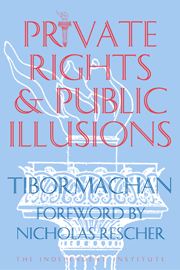When people set out to buy or sell in the marketplace, they do so with some terms in mind. But they don’t know the exact terms they will accept before they start bargaining or as they compare different offers (among stores in a mall, for example). Indeed, considering a trade is itself only the first step to establishing its terms. As the process culminates, prices and other mutually acceptable conditions are determined.
Some view this as if the parties would need to compromise, since they do not usually end up with the terms they initially have in mind. There is, however, no compromise involved at all since there is no such thing as one party to the trade alone knowing what the price is. As in any necessarily cooperative venture, all participants, together, establish the crucial features involved. (In language, for instance, no one individual sets the precise meaning of concepts or words.) They may stick to some minimum requirements without which they will refuse to trade, in which case no price will be agreed to. Finding the right price is a necessarily mutual process, since it is something that registers the terms of agreement, as it were.
Sometimes people feel awkward about not accepting another’s terms right from the start. It seems like asserting themselves too much. This is more a sign of lack of confidence in their own role in the market process, as if the parties didn’t have justice on their side by asserting their own interests. Well, one feature of justice is that when two or more parties consider coming together on some matter, they do so on mutually agreed terms rather than compelling someone to comply with the demands of another in the process. This is because justice is, in part, respect for another’s standing as a full human being, a person with his or her judgments to make about his or her conduct in life, including whether and on what mutual terms to join others in certain endeavors.
This kind of justice, however, is conditioned on a more basic moral principle-that one’s own life is not only for one to govern but ought also to be enhanced, for example, via trade. This is the practice of prudence. There can be occasions when the virtue of prudence is not so urgent as would be generosity or courage. Still, it is normally vital to living a good human life, so justice must make room for it, for example, in the course of commerce.
Now some interesting points follow from this. One is that obtaining what is deemed a high price for one’s goods and services is going to depend, in part, on how those kinds of things are being received throughout the marketplace. Another is that most attempts to obtain a high price need to be understood as perfectly justified, unless, of course, they are outrageous (in comparison to how such goods or services fare in the marketplace). Even when folks find a price annoying, say when it is raised comparatively high in times of crises, they need to recall that such a move is often an honest expression of hope for some extra revenue for the seller in the light of a rare opportunity. This is nothing to scoff at. No one scoffs at it when done for people by their representatives in contract negotiations or when an agent embarks in one’s behalf in selling real estate. Some do call it gouging when folks try to cash in on the sudden need of others, but such is not the case unless deceit or fraud is perpetrated.
Furthermore, the derided business practice of advertising is best understood as a kind of hopeful holler to us from sellers who are trying to put meals on their tables, kids through school, or insurance payments in the mail by attracting us to their goods and services. They are calling out to us—on radio, TV, magazines, billboards, flyers, catalogues (what we so harshly call junk mail)—so we might pay attention to what they are offering and we could well use. One should never get upset with advertising-it’s just the cosmetics employed by the sellers in the course of seeking out a trade, calling attention to their good features in the attempt to attract a good reception from potential buyers. It can misfire in some ways, including outright deception or, less drastically, tastelessness or stupidity.
It would be very nice, more generally, if many people didn’t have a one-sided view of the pursuit of economic well-being. This one-sidedness consists in finding one’s own pursuit honorable but that of others nearly always degrading. Such an adjustment of attitude would do a lot to raise the reputation of the free market and, thus, of the prospects of general prosperity.
A Friendly View of Dealing
Also published in The Freeman
This article is reprinted with permission from The Freeman, May 1997. © Copyright 1997, the Foundation for Economic Education.
Tibor R. Machan (1939–2016) was a Research Fellow at the Independent Institute and the R.C. Hoiles Professor of Business Ethics and Free Enterprise at Chapman University
Comments
Before posting, please read our Comment Policy.








